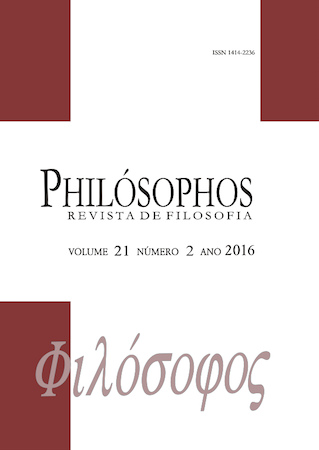NIETZSCHE E AS TERAPIAS HELENISTAS: ESTÓICOS E EPICURISTAS COMO PRECURSORES DO CRISTIANISMO
DOI:
https://doi.org/10.5216/phi.v21i2.43133Palavras-chave:
Estoicismo, Epicurismo, Filosofia como Terapia, Cristianismo.Resumo
O presente artigo tem como foco a relação ambivalente de Nietzsche com os filósofos do período helenista, em particular os estóicos e os epicuristas. Mais concretamente, procuraremos determinar por que razão, apesar da extraordinária influência que estas escolas exerceram no seu pensamento, Nietzsche se lhes viria a opor tão violentamente na fase mais tardia da sua obra. Seguindo o trilho da avaliação que Nietzsche faz destes filósofos terapeutas enquanto, ele próprio, "médico da cultura", verificaremos que as principais críticas de Nietzsche a estas escolas são muito semelhantes às que dirigiria ao cristianismo e vão ao encontro da própria ideia de terapia, tal como tradicionalmente concebida. Defenderemos que Nietzsche vê os filósofos helenistas como importantes precursores do cristianismo, responsabilizando-os pela criação do enquadramento e mundividência sem os quais este não se teria podido desenvolver. Tanto estóicos como epicuristas se revelam, assim, "pseudo-médicos", razão pela qual, como concluiremos, Nietzsche os vê como promotores fundamentais do niilismo que diagnostica na cultura ocidental.Downloads
Downloads
Publicado
Como Citar
Edição
Seção
Licença
Autores que publicam nesta revista concordam com os seguintes termos:
- Autores mantêm os direitos autorais e concedem à revista o direito de primeira publicação, sendo o trabalho simultaneamente licenciado sob a Creative Commons Attribution License o que permite o compartilhamento do trabalho com reconhecimento da autoria do trabalho e publicação inicial nesta revista.
- Autores têm autorização para assumir contratos adicionais separadamente, para distribuição não-exclusiva da versão do trabalho publicada nesta revista (ex.: publicar em repositório institucional ou como capítulo de livro), com reconhecimento de autoria e publicação inicial nesta revista.















